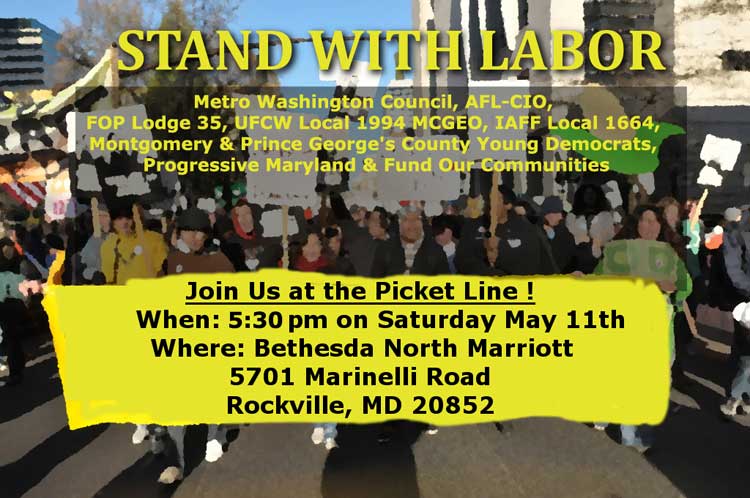As outlined in Part I, voters seemingly had settled the battle between the Fraternal Order of Police (FOP) and the County over effects bargaining in favor of the County. In the 2012 referendum known as Question B, 58% of voters supported the County’s decision to allow the Police Chief to take more actions without the need to consult FOP management.
The referendum turned out to be the beginning rather than the end. The public employee unions (FOP, the Firefighters, and MCGEO) struck back by calling for a boycott of the annual Democratic Spring Ball. For those of you who are not regular attendees at this soiree, it is essentially a giant coffee klatch for local politicos and their fans complete with dancing. It’s held, like virtually all of these events, at the Bethesda North Marriott Conference Center.
Having felt abandoned by the local Democratic Party, the unions–long party stalwarts–decided to withhold their money and to make their displeasure public. Ingeniously, they styled the boycott as a picket line, knowing that labor-loving Democrats hate to cross them (or at least be seen crossing them). As none of the workers at the Center were on strike, it wasn’t really a picket line in the traditional sense but it made for great optics and amped up the pressure.
Republicans, as usual, were mad that they hadn’t thought of the idea first. Montgomery Republicans would get far better attendance at their events if people thought that they would have the privilege of strike breaking in the process.
The Montgomery County Young Democrats (MCYD), led by President Dave Kunes, jumped on the boycott bandwagon. Kunes, formerly an aide to Del. Tom Hucker (D 20) and now Maryland State Education Association (MSEA) Field Director, had some experience with seizing opportunities to challenge organization leadership, as he led the successful insurgent slate that took control of MCYD in 2012.
The problem for MCDCC was less monetary–donors stepped up and helped the party cover losses–than morale and the apparent division. It also put the Democratic elected and party leadership on the defensive politically and ideologically.
None of this had any chance of helping the Republicans. Remember, Montgomery is a one-party county and this battle was about jockeying for power and influence over the one political vehicle worth driving–not a clunker.
Part III looks at the major upcoming changes on MCDCC.


